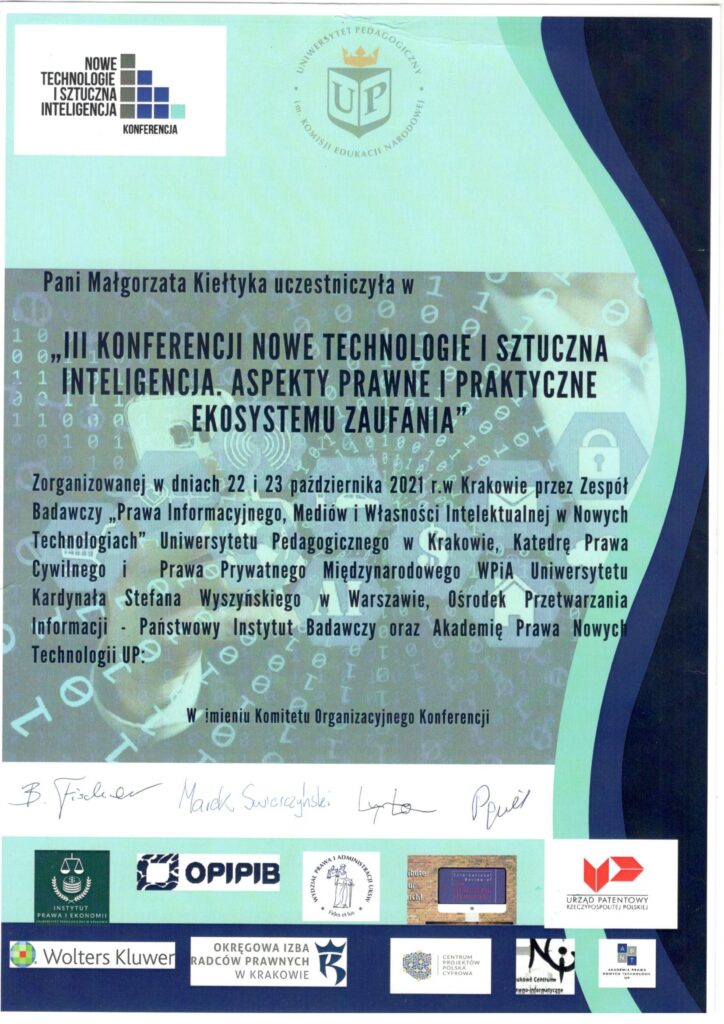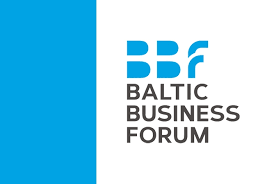KIELTYKA GLADKOWSKI KG Legal took part in III Conference “New technologies and artificial intelligence. Legal and practical aspects of the trust ecosystem.” (LINK) The conference was held online on 22 October 2021. The organizers of the conference were: Research Team “Information Law, Media and Intellectual Property in New Technologies” of the Pedagogical University of Krakow, Chair of Civil Law and Private International Law, Information Processing Centre – National Research Institute, Academy of Law of New Technologies – Pedagogical University of Krakow.
The conference included the following panels:
- Artificial Intelligence as a tool in civil law and civil procedure
- New technologies from the perspective of public law and other sciences
- Protection of the Artificial Intelligence’s products
- Legal and non-legal aspects of Artificial Intelligence’s working.
More
On 1-2 December 2021, KIELTYKA GLADKOWSKI KG LEGAL will participate in the 13th Baltic Business Forum HYBRID in a hybrid formula. The event is organized by the International Association Europe – North-East, the Polish-Ukrainian Chamber of Commerce and the City of Świnoujście. It will take place in Świnoujście and everywhere – that is, online.
The main objective of the Baltic Business Forum is to strengthen cooperation in the region of Adriatic, Baltic, Black Sea. In order to strengthen the historical traditions of trade in the region, it is essential to invest in modern transport infrastructure, interconnectors for energy security, new forms of cooperation between authorities and local communities.
Some of the topics that will be covered will include:
What awaits the economy in 2022? How will the European Green Deal affect business? How is a regional transport hub emerging? Digital country and digital labour market.
More
Real estate investment is one of the most lucrative forms of capital multiplication. The real estate market is constantly growing and it is the least risky sphere of capital investment, however, it requires significant investment funds. To increase access for the less wealthy, special real estate funds are created to allocate assets to investors who want to start their adventure on the real estate market.
Types of real estate funds
The division into different categories of funds is made on the basis of the risk and rate of return of a given investment. They range from conservative to aggressive and are defined by both the physical attributes of the property and the amount of debt used to capitalize a project. We distinguish the following types:
The term “core” refers to real estates located in high-quality locations with high-quality tenants. Core property investors are looking to generate stable income with very low risk. These properties require very little hand-holding by their owners and are typically acquired and held as an alternative to bonds, generating stable and consistent cash flow to their owners and their values tend to be the least volatile.
- Core Plus Real Estate Funds
In terms of property class and profit prospects, these funds are similar to core funds, but with the low or moderate risk profile. Core plus property owners typically have the ability to increase cash flows through minor property improvements, management efficiencies or by increasing the quality of the tenants. The difference from previous funds is the fact that profit is not so easy to predict and core plus investment requires more active participation in property.
- Value – Add Real Estate Funds
More
So far, users have uploaded an enormous amount of 350 billion photos, and nearly 35 million people update their status every day on Facebook platform. With such numbers, it is very difficult to verify the content posted on the platform, which in a considerable number of cases violates community standards. In order to stop this dangerous process, the company had to undertake more technologically demanding solutions, so that it operates in accordance with legal and ethical standards.
Facebook Community Standards
The aforementioned Community Standards are the key for fighting with abuses on the platform. They are simply guidelines developed by Facebook’s employees, which list what is allowed and what is forbidden. They are based on user feedback and expert advice in areas such as technology, public safety and human rights. They apply to all users, are valid worldwide, and apply to all types of content. They have been divided into categories concerning: violence and illegal behaviour, security, objectionable content, integrity and authenticity, and even protection of intellectual property. Each of them describes specific behaviours/content that are strictly prohibited, and the catalogue itself grows with emerging socials problems. The most significant and widespread problem with violations of these standards is hate speech.
Classifiers – screening algorithms
More
Along with the development of technology, which gives us more and more opportunities, the risk of cyber-attacks on our personal data is also growing. Hackers are using more and more sophisticated methods of compromising security to achieve their goal. One of the forms of cybercrime is spoofing, i.e. a group of attacks on ICT systems consisting in impersonating another element of the IT system, the effect of which is achieved by placing prepared data packets on the network or incorrect use of protocols.
Spoofing definition
The term “spoof” dates back over a century and refers to any form of trickery. However, today it is mostly used when talking about cybercrime. Spoofing is the act of disguising a communication from an unknown source as being from a known, trusted source, which can apply to emails, phone calls, and websites, or can be more technical, such as a computer spoofing an IP address, Address Resolution Protocol (ARP), or Domain Name System (DNS) server. It can be used to gain access to a target’s personal information, spread malware through infected links or attachments, bypass network access controls, or redistribute traffic to conduct a denial-of-service attack. Also it is a good way to gains access to someone’s device in order to execute a larger cyber-attack. Successful attacks can lead to infected computer systems and networks, data breaches, and loss of revenue – all liable to affect the organization’s public reputation. In addition, spoofing that leads to the rerouting of internet traffic can overwhelm networks or lead customers to malicious sites aimed at stealing information or distributing malware.
How spoofing works?
More




